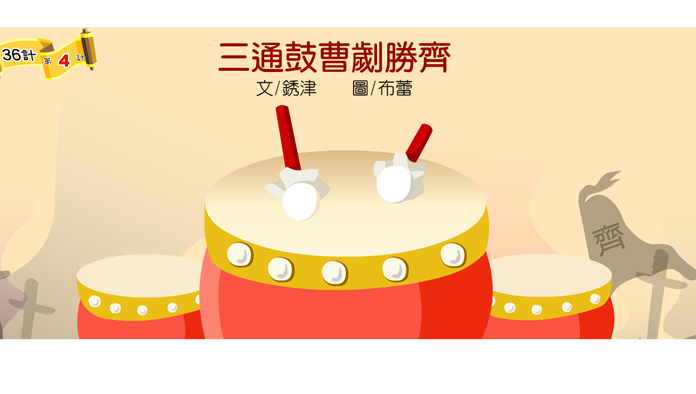春秋時,齊王用鮑叔牙當大將領兵攻打魯國,魯莊王知道後十分害怕,大臣施伯便推薦用隱士曹劌來應戰,好不容易說服曹劌,但是他只願做參謀。鮑叔牙因為以前打敗過魯軍,便十分輕敵,想一舉進攻活捉魯莊公,一時之間便戰鼓齊鳴,殺喊聲震天,士兵像排山倒海般衝過來。這時,曹劌制止莊公擊鼓進攻,只說:「等一下,現在敵人的氣勢正強,我們只要嚴加陣守,不要輕舉妄動。」齊軍衝過來後卻攻不進魯軍,被擋在軍陣外,這時鮑叔牙又再下令擊鼓進攻,還是攻不進去,他想魯軍一定是吃過敗仗,害怕得不敢接受挑戰,如果再攻一次,魯軍一定不戰而敗逃,於是第三次擊鼓進攻。曹劌聽到齊軍第三次擊鼓,便對莊公說:「現在是擊鼓出兵的時機了。」魯軍一聽鼓聲便以迅雷不及掩耳的速度衝出,齊軍被打得七零八落,莊公想乘勝追擊,曹劌又制止,等看到地上的車輪及馬蹄印,再到車頂看齊軍逃跑的方向,才說可以追。事後,魯莊公問:「為什麼齊軍三通鼓後才出擊?為何不馬上追齊兵?」曹劌說:「等敵人三通鼓後,敵人的士氣已不如剛開始那樣旺盛,這時我們才擊第一次鼓,我們的士兵自然是士氣高漲,再出其不意的進攻,一定會將敵人打敗。由於兵不厭詐,所以要觀察車馬足跡是不是真的很亂,表示是真的倉促中逃命的,這時才可以乘勝追敵。」
三十六計之第四計:以逸待勞
當雙方開戰時,想要消耗對方的實力,並不一定要硬碰硬的對打,可以先按兵不動,等到對方疲憊時,就可以讓我們和對方實力相當。
In the Spring and Autumn Period, the king of Ci appointed Bao Shu Ya as the general of his army to invade the country of Lu. The king of Lu was very frightened when he heard this. His minister Shih Bo recommended a hermit by the name of Cao Suei to lead the defense of Lu. It took a lot of effort to persuade Cao Suei to accept the post. But even then, he was only willing to work as a military adviser and not the general.
Bao Shu Ya did not take his enemy seriously because he had defeated the army of Lu before. And this time, he wanted to capture the king of Lu alive by attacking Lu directly. On the day of battle, the sound of drums and battle cries from the side of the Ci army was deafening, and the Ci army quickly charged the Lu army. At this time, Cao Suei dissuaded King Lu Jhuang from giving the signal to beat the drums telling the Lu soldiers to engage the Lu army. Cao Suei said, "Just wait a while. Right now the morale of the enemy is very high. We only need to defend ourselves at the moment. We need not act carelessly."
The advancing Ci army tried in vain to breach the defensive line of the Lu army. Frustrated, Bao Shu Ya ordered another charge without success. However, the failure of the Lu army to engage the charging Ci army both times let Bao Shu Ya to believe that the Lu army must be too scared to engage the Ci army in battle. He thought a third attack would surely break through and then the Lu army would collapse completely. So he ordered a third charge.
But this time, when Cao Suei heard the third drumming of the Ci army, he said to the king of Lu, "Now is the time to beat our drums and fight back!" The Lu army attacked as soon as they heard their own battle drums, and the Ci army's lines soon collapsed under the charge. Subsequently, when the king of Lu wanted to pursue the fleeing enemy, once again Cao Suei advised the king to wait until he checked the prints of the horses and the chariots and observed the directions where the Ci army had fled. Then he gave the green light for the Lu army to pursue. Afterwards, the king asked Cao Suei, "Why wait until their third attack? And why not pursue the retreating Ci army right away? "Cao Suei replied, "After the third drumming, the morale of the enemy was not as high as in the first drumming. Instead, the morale of our soldiers was just at its peak because we were beating our drums for the first time. Also, we took the enemy by surprise because after what had happened after their first two charges, they expected us to just stand our ground instead of charge back at them, and this element of surprise is what guaranteed us a victory. Afterwards, since the risk of being deceived by the enemy always exists, we must check the wheel prints of the horses and the chariots in order to make sure that the enemy had indeed fled in panic before we could safely pursue the enemy."
Strategy 4: Wait for the Exhausted Enemy at Your Ease
When the battle begins, it is not necessary to fight a more powerful opponent immediately. Sometimes you could weaken your opponent by your inaction or by avoiding him in direct battle. Wait and conserve your strength while your opponent tires and becomes exhausted. This will allow you to equalize your relative strengths when you finally engage him in battle.


